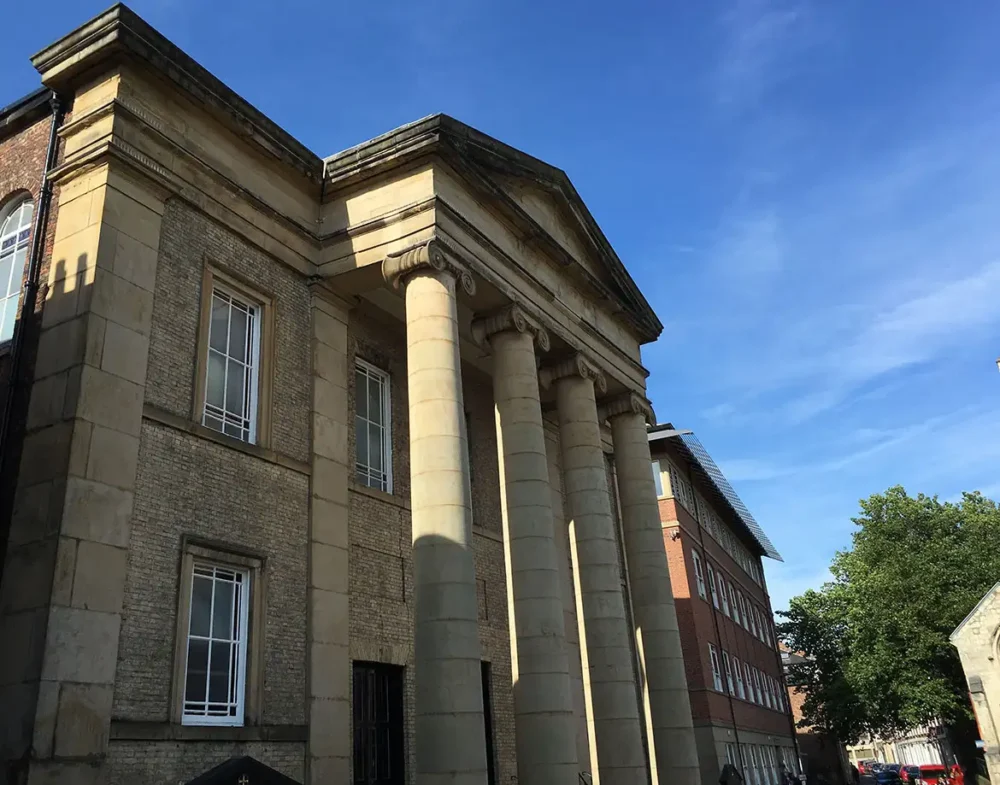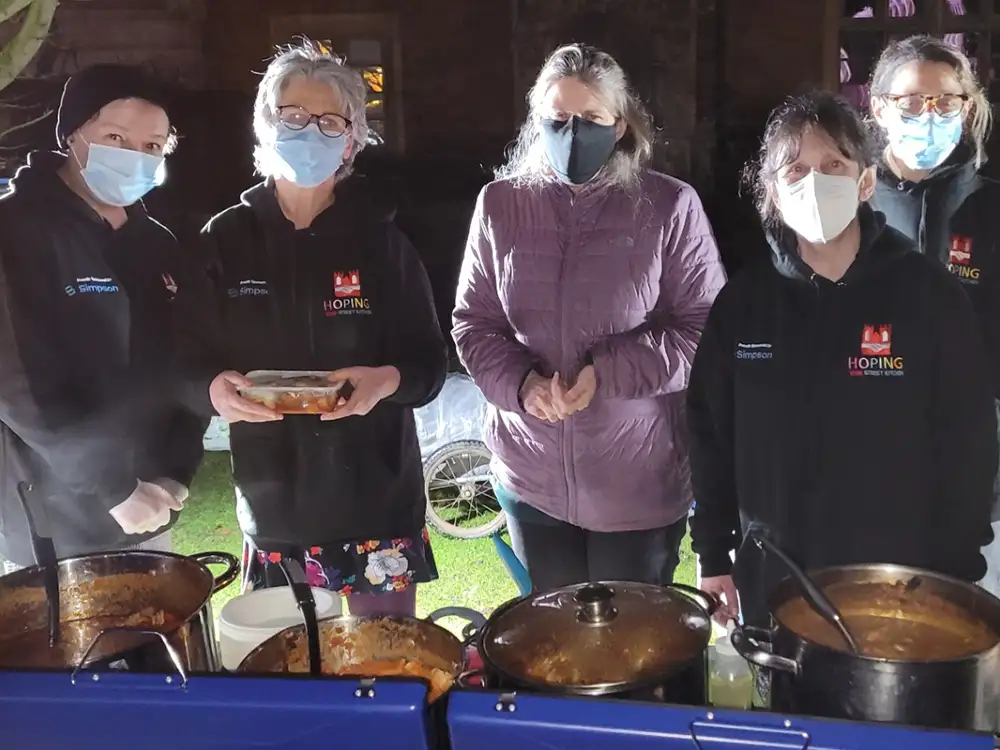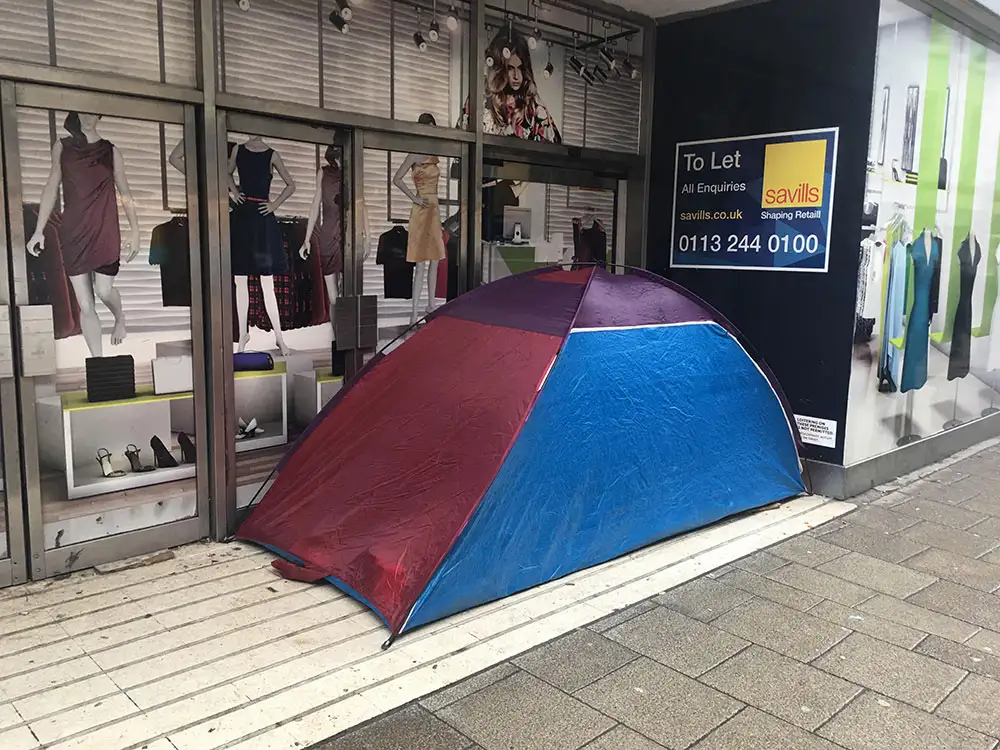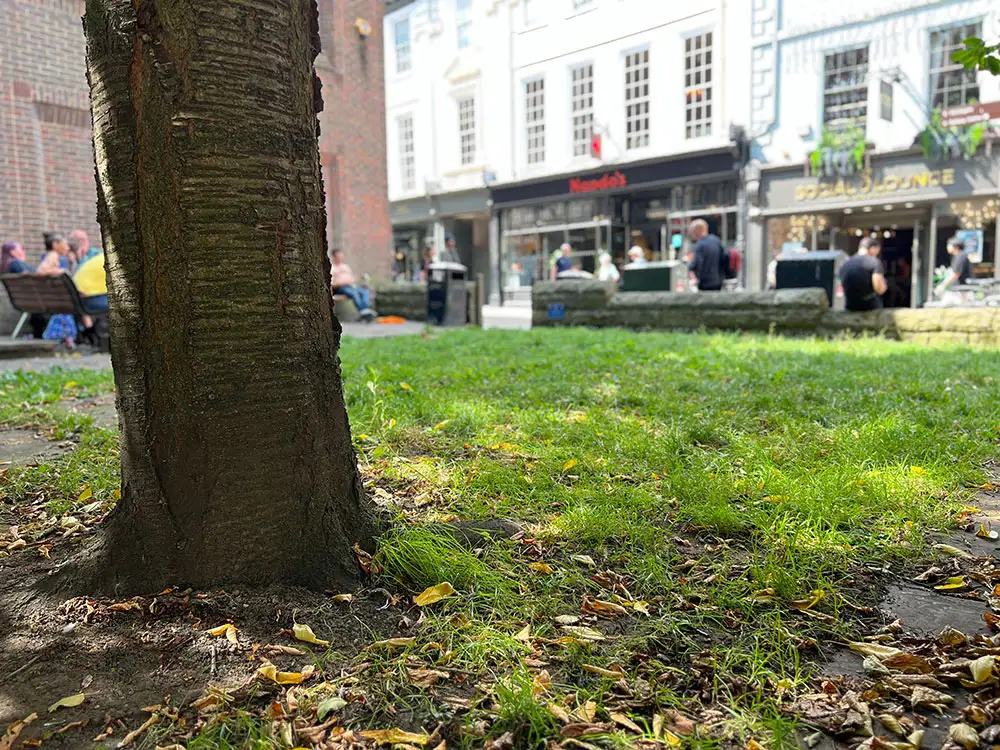In part three of our Unheard York series, John and Dave explain why their complex circumstances means ‘normal’ accommodation doesn’t work for them right now
“Society has an idea of where everyone should live – but not everyone fits into all those systems.”
John is speaking to us with his friend Dave, at Lived Insights’ weekly drop-in cafe. They both know what it is like to be homeless, sleeping on the streets.
But they also know why the systems designed to reduce homelessness don’t necessarily work. Both have complex, unusual experiences to share.
John was living 50 or so miles from York, running his own cafe. But then he went missing. Video footage exists showing him walking out of his home, arguing with nobody, and the next thing he recalls is being in York.
He hopes one day to be back in housing, but his mental health means that’s not what he needs or wants right now. He fears permanent accommodation would imprison him, a scenario he is determined to avoid.
“I hear voices, and I see things that are not there,”John told YorkMix. “I remember being in my flat and the voices were getting worse. I heard a voice saying ‘we’re going to leave and live on the street‘ and I would say no, but one day that voice won.
“I stayed on the streets, and then the police found me after about seven weeks. I had been reported missing by my mum a few days after I had gone. I had left my keys, my bank card, my phone.
“They had me as a medium-risk missing person, and they said they were close to putting me as high-risk, then they found me. I was in the courtyard of the church near Nando’s in town, and someone had recognised me.
“York police spoke to Humberside Police, but I was just a missing person, I hadn’t done anything, so they had done their bit in finding me.
“Nobody then spoke to me about anything else, like housing provision or where to go. I had gone missing and wasn’t really aware of what was going on. If they had put me in touch with a psychiatric nurse or something, I might have been able to go home sooner.
“In the end, I went back home in the December and managed a month inside, then went back out again. Then I went back again at December 2023 and managed two months.
“I was using Carecent. I felt safe going there. I’ve wondered whether there should be stuff there about missing people, or whether it should be a safe space for everyone, even if they are missing. I’m not sure.
“Carecent has been a godsend, the people that volunteer there are brilliant.
“I was using Carecent and was obviously homeless, but nobody who was there from the council ever spoke to me or asked me anything. I think that was poor.
“It was Charlie from the Salvation Army who talked to me in the end. He found me sleeping and approached me, and I got some help then. Charlie was brilliant. He was down to earth. He was the kind of person that if you were being a dick-head, he would say so, and I liked that.”
‘They kicked me out’
Charlie introduced John to the Nap Pads in Ordnance Lane: compact rooms in a block like a shipping container each with a bed, sink, toilet and charging points.
“For me, that was fantastic. It was a safe space to get my head down. I was scared of going back into a house, and of it becoming a prison to me.
“The Nap Pad worked for me because I had to come out every day if I wanted to cook or have a shower. Some people had said the Nap Pads should have showers or kitchen facilities, but not for me.
“Some nights, I still stayed out, but a lot of the time I went to the Nap Pad. It was what I needed. I was there for a few months, but then I was asked to leave because I would not move on to permanent accommodation.
“The council said I had to move on, but I couldn’t, so they kicked me out. It was the only place that was safe and right for me, and the council said it was not OK.
“Charlie talked to me about a house-share, a room, even a caravan. But I needed the Nap Pad, and that was the only thing he couldn’t give me.
“What I needed was the NapPad or something like that, but for as long as I really needed it. I do want to go back into housing, but I’m not ready. Removing the Nap Pad, taking that away, removed my only option at the moment for somewhere to go.”

John says Charlie also introduced him to an NHS psychiatric nurse, who he now sees once or twice a week.
“She helps me understand the voices. I’m a rational person; I know the voices are not real and if I see things I know they’re not real. Every so often I have episodes where I believe things are real, but afterwards I know they were not.
“The nurse is very modern and good. She doesn’t want to put me on meds and doesn’t want to ‘diagnose’ me. She helps me understand it and I can talk to her. She has also now started a voices group as well at Carecent, with other people on board.
“The ideal for me would still be the Nap Pad. That’s what I need right now because there’s no threat or fear of that becoming a prison to me, in the way a house could. I know in a house, that could creep up on me. The distance I get from the house would get less and less and less, and then I would stop going out and it would be a prison.”
When asked who he most wants to hear his story, John says: “I want York council to hear this and to see what they’ve done by removing the Nap Pads.
“You need lots of support options. Loads of people on the streets have got paranoia issues and might believe the council or whoever is against them.
“If you don’t like or trust one organisation, it’s good having different types of support you can access. It feels like now, there will be less choice, less options.

“The places I go are Carecent, here [the Lived Insights cafe], Hoping Street Kitchen outside the Art Gallery every Sunday, and Kitchen For Everyone on Wednesday evenings.”
“Society has an idea of where everyone should live – but not everyone fits into all those systems.”
“Me and my mum are good now and I can go back there when I want to, but York is very safe and there are nice people out there.”
Where would you like to be five years from now?
“Five years on? There would have been a time I would not like to think about that, but now I would like to think that I will be back in a house. I do not think I will do that through the council. They are all nice people, and I’m not saying bad things about them, but I think there are serious flaws in their systems.
“Hearing voices is exhausting; it’s shattering. My paranoia or anxiety goes through the roof. Entrusting that all to the council? I couldn’t do that.
“There are fears for me going inside. A fear of things that might happen. I’m a positive person; I’m not depressed. One of the voices I hear is horrible, but I’m a pleasant person.”
‘People are nicer here’

John is talking to us with his friend Dave. They first met on the streets. Dave too has experienced long-running mental health difficulties, which have left him unable to live safely in a house.
“I was born in Sheffield then lived in Barnsley, and came to York from Barnsley. I don’t know why I came to York – my mum used to come here and had brought me here once, so the train brought me here and I liked it. Even on the streets, people are nicer here. There are other places, where there would be more risk.”
He says his mental health could not stay steady living in a house. “If you have someone else with you, maybe you can do it, but on my own, knowing that every year they will be asking more from you (more rent, more for gas and electric), I couldn’t.
“I had tried killing myself and was sectioned, and I was in a flat and didn’t want to be there. I slowly cleared out my flat over a couple of years, and the more I got rid of, the better I felt.
“The only thing left was to walk away. I looked at different places, but nowhere compares to York. Nottingham was okay, but a bit big. Harrogate was nice, but I liked it more here in York.”
Had he received better support years earlier, things may be different, but Dave says living on the streets is the only lifestyle his mental health can now manage. He does not feel scared, and says he does not claim any social security payments.
“In the world, we are constantly being told things to do. You get level, then something else pops up; you get level again and something else pops up. I just need a place to go at night where it’s dry and nobody is telling me to go away.
“I have a tent, but I prefer not to use it, and I make sure I tidy up. If you tidy up after yourself, nobody really bothers you.
“My mum had died in 2016. That was the point for me becoming aware of my mental health. After a couple more years’ working in a supermarket, I just couldn’t do it any more.
“I worked for myself for a year and a half, then I was on Universal Credit but I could not sort it out all the time. When Covid kicked in, my mental health just broke. I had an anxiety attack and went to hospital, and stayed in for six months.
“When I got out, I was still not fully right, but was better and didn’t want to kill myself anymore. But then a year after, it happened again, and I tried killing myself again. Since then though, my mental health has been getting better and better. This time next year, I want to see how I feel, and if I feel a lot better, I will sort out what I want to do.
“I help at an allotment and I create art and have options of making T-shirts. Being on the streets actually means I’ve met a lot of people and done a lot of different things I would never have dreamt of doing before.
“Everything I am doing is to better myself. Ever since I was born, I was told to do this, do that and I have done it, but it never felt right. Now, I don’t need to, and I’m a better person.
“I don’t have an addiction at all. I grew up near drugs and I know what drugs can do to people, so even when my mum died drugs wasn’t an option I even looked at. Other people might take the option of something that promises to take the pain away.”
- The two people in this story chose to protect some of their privacy, so have used the names John and Dave as pseudonyms
